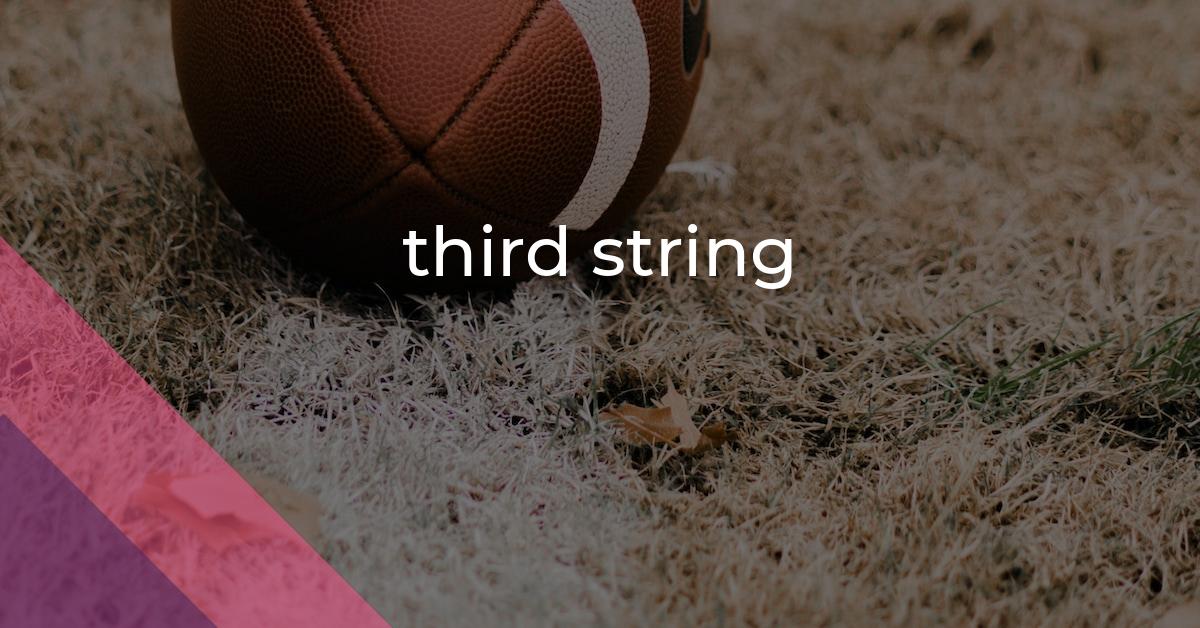third string: Idiom Meaning and Origin
What does ‘third string’ mean?
The idiom "third string" refers to being the least skilled or experienced person in a particular group or organization.

Idiom Explorer
The idiom "wooden spoon" refers to someone who consistently finishes in last place or fails to win. It derives from the tradition of awarding a wooden spoon to the loser of a competition or game.
The idiom "unused to" is used to describe a situation where someone is not accustomed to or familiar with something. It implies a lack of experience or familiarity in a particular context or activity.
The idiom *unknown quantity* refers to someone or something that is not well known or understood, making it difficult to predict their actions or outcomes.
An idiom that means someone is very poor and has no money.
The idiom "two left hands" means being clumsy or lacking skill in performing tasks requiring manual dexterity.
The idiom "two left feet" refers to a person who is clumsy or awkward, especially when it comes to dancing or physical coordination.
The idiom "two-bit" refers to something or someone of little value or importance, often used to describe something cheap or insignificant.
The idiom "try one's hand" means to attempt or make an effort at doing something, especially when it is a skill or activity that one is not familiar with or experienced in.
Understanding the Pecking Order
The idiom "third string" has its origins in American football. It specifically refers to the players on a team who are considered to be third in line for their position. These players are typically seen as less skilled or experienced compared to the first or second string players. This metaphorical usage of the term extends beyond the realm of football and is used to describe someone or something that is considered to be of lesser importance, ability, or priority. It conveys the idea of being in a lower ranking or less desired position.
The term "third string" can be applied in various contexts. In a business setting, for example, someone who is considered to be "third string" may be seen as a less significant employee or may occupy a lower position within the company. This individual may not have the same level of authority or responsibility as their counterparts who are in higher-ranking positions.
Similarly, the term can also be used to describe objects or items that are not as high in quality or desirability. A product that is considered to be "third string" may be seen as a cheaper or less reliable alternative compared to higher-end options. This perception of lower quality can affect the desirability or demand for the product in question.
When it comes to the related idiom "second string," it refers to the players who are second in line for their position on a team. These players are typically substitutes or backups who are ready to step in should the first string players be unable to perform. While the first string players are considered the top performers, the second string players are still highly skilled and valuable assets to the team. However, they may not receive as much recognition or playing time as the first string players. In a broader context, "second string" can be used to describe individuals or things that are not the primary choice or the most highly regarded option.
Another related idiom is "third-rate." This term is often used to describe something that is of low quality or not up to par. It can refer to a substandard or inferior product, service, or performance. The use of "third-rate" implies that something is not at the level of excellence or competence that one would expect. It conveys a sense of disappointment or dissatisfaction with the quality or standard of whatever is being described.
The final related idiom is "third wheel." This phrase is often used to describe a person who is not needed or included in a situation involving two other people. It conveys the idea of being an extra or unnecessary presence. The term originated from the image of a tricycle, where the two main wheels represent a couple or a pair, and the third wheel is an extra wheel that is not required for the tricycle to function. In a broader sense, "third wheel" can be used to describe anyone who feels left out or excluded from a group or activity.
The idiom "third string" originated in American football and is used to describe players who are third in line for their position. It has since been adapted to convey the idea of being in a less important or inferior position in various contexts. The related idioms "second string," "third-rate," and "third wheel" all share common themes of being of lesser importance or quality. These idioms can be used to describe individuals, objects, or situations that are not considered to be the top choice or the most desirable option.
Example usage
Examples of how the idiom "third string" can be used:
- He was a talented musician, but he never made it past being third string in the band.
- In the football team, the first and second string players were injured, so they had to bring in the third string quarterback.
- During the performance, the lead actor fell ill, and the third string actor had to step in at the last minute.
The phrase "third string" is typically used to describe someone or something considered to be of lower quality or skill. It originates from the hierarchical order of players in sports teams, with the first string being the top-tier players, the second string being the second-best option, and the third string being the last or least preferred choice. The term is now often used metaphorically to refer to any situation where someone or something is considered inferior or an alternative choice.
More "Sports" idioms



